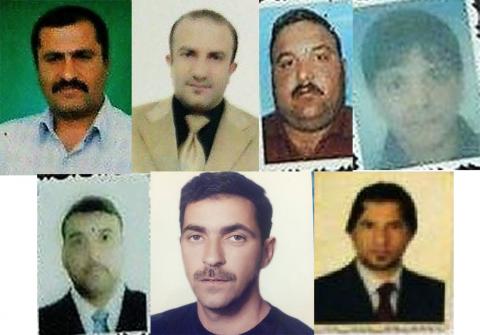From Erbil to Baghdad, practice of enforced disappearances has swept across all regions of Iraq in recent years

Between December 2017 and February 2018, Alkarama and Al Wissam Humanitarian Assembly submitted seven more cases of disappearances in Iraq to the United Nations Committee on Enforced Disappearances (CED).
Hamid Al Zoubai, Ahmad Al Dulaimi, cousins Duraid and Sattar Al Janabi, and brothers Falih, Salih and Meshtaq Al Janabi all disappeared in 2014 in different regions of the country.
These cases are indicative of the systematic practice of enforced disappearances across Iraq, where the rate of missing people remains one of the highest worldwide.
Abducted by the Asayish in Erbil
Ahmad Al Dulaimi was arrested in Erbil on September 16, 2014 by the Asayish, the Kurdish security organisation and the primary intelligence agency operating in the Kurdistan region in Iraq. The 47-year-old Baghdad-based accountant was visiting his wife’s family in Erbil when members of the Asayish raided the home. After being physically assaulted, he was taken to an unknown location.
Al Dulaimi’s family believe that he was taken to the Asayish’s headquarters in Erbil. However, upon visiting the headquarters to enquire about Ahmad’s fate and whereabouts, the Asayish denied detaining him. Out of despair, his family sent a letter to the Iraqi president, but to no avail.
Established in 1993, the Asayish has been accused regularly of serious human rights violations such as carrying out unlawful detentions, torturing terror suspects, and cracking down on freedom of speech, including through the use of violence against journalists. In recent years, there has been a surge in the number of allegations of enforced disappearances committed by the Asayish.
On November 7, 2017, dozens of people demonstrated in Kirkuk demanding information on their relatives allegedly detained by Asayish forces. Those missing are mainly Sunni Arabs displaced to Kirkuk or other residents of the city who were detained by the Asayish on suspicion of affiliation to the Islamic State after Kurdish forces regained control of the city in June 2014.
Three disappearances in Baghdad
On June 12, 2014, 41-year-old Duraid Al Janabi and his cousin, 46-year-old Sattar Al Janabi, were arrested in Baghdad by 10 members of the Iraqi army. During the arrest, soldiers confiscated their IDs, passports, mobile phones and laptops. The two men were forced into a white Silverado Chevrolet pickup truck without registration plates before being transferred to an unknown location. Since then, and despite enquiring several times with different government agencies and detention facilities in Baghdad, the families have not received any information on their fates and whereabouts.
As for Hamid Al Zoubai, a 28-year-old labourer from Baghdad, he was violently arrested at his home by members of the Iraqi army on May 20, 2014. Al Zoubai’s mother, his nephew and neighbours all witnessed the arrest. They believe that the army had been tipped off by a secret informant on the basis of fabricated information. In their quest for information regarding Hamid’s fate and whereabouts, they exhausted all remedies at their disposal, but to no avail.
The abduction of the Al Janabi brothers
In the early evening of September 9, 2014, the Federal Police and the Iraqi army violently arrested brothers Falih, Salih, and Meshtaq Al Janabi.* Aged between 24 and 39, the three labourers from Latifiya were apprehended at their home. During the abduction, their personal belongings were confiscated while the rest of the family was forced to stay in another room.
Having received no news from the three brothers, the Al Janabi family enquired about their fate and whereabouts at the Latifiya police station, the Iraqi Central Criminal Court, the Ministry of Human Rights, the Tasferat Prison, the Muthanna Airport Prison, Baghdad Airport Prison, and the headquarters of the 17th Division and first regiment of the Iraqi army, all to no avail.
Systematic practice of enforced disappearance in Iraq
As a party to the Convention on Enforced Disappearances (ICPPED) since 2010, Iraq has a legal obligation to halt the practice of enforced disappearances, which has reached epidemic proportions in recent years. This entails that the central government has an obligation to collaborate with the Kurdish regional government in order to address the human rights violations committed by the security agencies under its authority in the Kurdish autonomous region of the country.
*The Al Janabi surname is a common family name in Iraq. Duraid Al Janabi and his cousin, Sattar Al Janabi are not related to Falih, Salih, and Meshtaq.
For more information or an interview, please contact media@alkarama.org (Dir: +41 22 734 1006).
